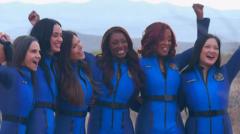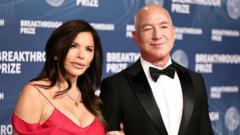In a significant milestone for space tourism, Blue Origin’s New Shepard rocket launched an all-female crew, including pop star Katy Perry, back to Earth after a brief spaceflight. The six women, which also included CBS presenter Gayle King and Lauren Sánchez, Jeff Bezos’s fiancée, made headlines with their 11-minute adventure that took them over 100 kilometers (approximately 62 miles) above Earth, crossing the recognized boundary of space.
The flight, which launched from West Texas at 8:30 AM local time (14:30 BST), marked a historic moment as it was the first all-female space mission in over six decades. The crew experienced weightlessness for the brief duration of the flight, with King describing the experience of hearing Perry sing "What a Wonderful World" in space as a highlight.
As the capsule returned safely with a parachute-assisted landing, jubilant cheers filled the air. The crew expressed their immense joy and connection to the universe after landing. Perry, who kissed the ground upon disembarkation, shared her reflection on feeling “super connected to life.” Similarly, King and other crew members relished their experiences, with Sanchez wiping away tears of pride as she welcomed the crew back.
Reaction from celebrities witnessing the launch added an extra layer to the occasion. Khloé Kardashian expressed her surprise at her emotional response, while Oprah Winfrey praised King for overcoming her fear of flying. However, the mission did not escape critique. Some experts highlighted that the focus on celebrity missions could overshadow essential scientific pursuits.
Dr. Kai-Uwe Schrogl from the European Space Agency voiced concerns that such missions are perceived as luxury tourism rather than scientific research, which some deemed inappropriate for the serious work of space exploration. Social media reactions were mixed, with many celebrating the historic all-women crew, while others voiced cynicism, framing the flight as a publicity stunt.
Despite criticism, Gayle King argued for the importance of dreaming big and inspiring the next generation, noting the profoundly positive response from young women and girls. Lauren Sánchez also condemned detractors of the mission, emphasizing the devotion of Blue Origin’s employees.
Blue Origin, founded by Bezos in 2000, aims at making space travel more accessible. While ticket prices have not been fully disclosed, an initial deposit of $150,000 is required to reserve a spot on the flight. Beyond space tourism, the company is developing sustainable space infrastructure, including reusable rockets.
Yet, the rise of private space tourism has raised concerns over environmental impact. Scholars like Eloise Marais have warned about rocket emissions potentially affecting the ozone layer, while supports argue for innovation and greater accessibility to space exploration.
As space tourism continues to evolve, experts emphasize that inclusivity and environmental consciousness must guide its growth, illustrating a fascinating intersection of celebrity culture, technological advancement, and scientific exploration at the brink of the final frontier.
The flight, which launched from West Texas at 8:30 AM local time (14:30 BST), marked a historic moment as it was the first all-female space mission in over six decades. The crew experienced weightlessness for the brief duration of the flight, with King describing the experience of hearing Perry sing "What a Wonderful World" in space as a highlight.
As the capsule returned safely with a parachute-assisted landing, jubilant cheers filled the air. The crew expressed their immense joy and connection to the universe after landing. Perry, who kissed the ground upon disembarkation, shared her reflection on feeling “super connected to life.” Similarly, King and other crew members relished their experiences, with Sanchez wiping away tears of pride as she welcomed the crew back.
Reaction from celebrities witnessing the launch added an extra layer to the occasion. Khloé Kardashian expressed her surprise at her emotional response, while Oprah Winfrey praised King for overcoming her fear of flying. However, the mission did not escape critique. Some experts highlighted that the focus on celebrity missions could overshadow essential scientific pursuits.
Dr. Kai-Uwe Schrogl from the European Space Agency voiced concerns that such missions are perceived as luxury tourism rather than scientific research, which some deemed inappropriate for the serious work of space exploration. Social media reactions were mixed, with many celebrating the historic all-women crew, while others voiced cynicism, framing the flight as a publicity stunt.
Despite criticism, Gayle King argued for the importance of dreaming big and inspiring the next generation, noting the profoundly positive response from young women and girls. Lauren Sánchez also condemned detractors of the mission, emphasizing the devotion of Blue Origin’s employees.
Blue Origin, founded by Bezos in 2000, aims at making space travel more accessible. While ticket prices have not been fully disclosed, an initial deposit of $150,000 is required to reserve a spot on the flight. Beyond space tourism, the company is developing sustainable space infrastructure, including reusable rockets.
Yet, the rise of private space tourism has raised concerns over environmental impact. Scholars like Eloise Marais have warned about rocket emissions potentially affecting the ozone layer, while supports argue for innovation and greater accessibility to space exploration.
As space tourism continues to evolve, experts emphasize that inclusivity and environmental consciousness must guide its growth, illustrating a fascinating intersection of celebrity culture, technological advancement, and scientific exploration at the brink of the final frontier.




















